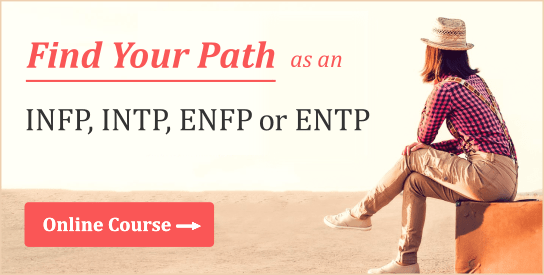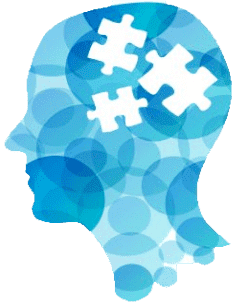
Introverts are notorious for needing plenty of time alone. When this time is spent engaging in contemplation or self-reflection, Introverts are, in effect, developing their “autonomy muscles.” The ability to think and behave freely and independently stands at the center of our conception of autonomy.
If Introversion (I) secures the requisite time and space for inner reflection, Intuition (N) is the turbo-charger of autonomous thinking, revealing new possibilities, perspectives, and ways of living and being. Intuition also doesn’t shy away from scrutinizing cultural norms and conventions, which is why Intuitives are sometimes construed as social outsiders or misfits.
It’s therefore unsurprising when Intuitive Introverts–INFP, INFJ, INTP and INTJ personality types (collectively, “INs” or “IN types” )–highlight their sense of uniqueness or autonomy. Among other things, these types cite their willingness to question popular sentiment and pave their own path, gradually developing and refining their individual tastes, beliefs, and perspectives.
The sister of autonomy is freedom. One aspect of freedom is liberation from undue external coercion or constraint. This often entails living in a “free country” with democratic processes. And although political freedom is undoubtedly necessary and important, it’s really only the tip of the freedom iceberg.
How Intuitive Introverts Approach Freedom
As discussed in my post, The “Day Job” Reconsidered, IN types spend a lot of time focusing on another aspect of freedom: the need for freedom, autonomy, and self-expression in their work. Those with the strongest stirrings in this direction are typically compelled to pursue some sort of creative or entrepreneurial path. For such types, the drudgery of mundane or routinized work is enemy number one—a fetter to creative freedom. Indeed, some INs will fight tooth and nail in attempt to extricate themselves from their day job en route to an envisioned Promised Land of Absolute Freedom (these sorts of big dreams can be incredibly powerful motivators).
Those who manage to reach this long-anticipated Promised Land may encounter a not-so pleasant surprise awaiting them. Colin Wilson, in his thought-provoking book, Frankenstein’s Castle, illustrates:
I had always wanted freedom—freedom from the dreary need to work for a living, freedom to live a life of the mind. Yet if I woke up in my room on a Saturday morning, with a weekend of ‘freedom’ in front of me, I might find myself trapped in a curious lukewarm state of indifference. Why does meaning seem to vanish like a will-o’-wisp as soon as we have time to devote to it?
On such occasions when INs finally manage to reach the carrot of freedom at the end of the proverbial stick, they may find themselves, like Wilson, feeling strangely indifferent. Not only does this catch them off guard, but it can also rattle them to the core. After all, if their long-awaited life’s purpose fails to deliver as promised or, worse, turns out to be nothing but an illusion, then they know they’re in serious trouble. Without the promise of a higher calling, some may lose their zest for life, perhaps even their will to live.
When windows of “free time” don’t live up to their imagined luster, INs may start to realize that their quest for freedom isn’t over. While they may have squirreled away enough nuts to live or work independently, their quest must now take a decidedly inward turn.
Fortunately, INFP, INFJ, INTP and INTJ types aren’t strangers to inner freedom. All have tasted it in times of immersive flow when, to paraphrase Thomas Merton, “we both lose and find ourselves.” In such moments, the unwanted stuff—e.g., doubt and self-consciousness—recede, while a satisfying sense of unity, purpose, and worthiness takes center stage. Indeed, it’s the salience and felt significance of such experiences that prompt INs to scratch their heads whenever they find themselves feeling lukewarm before their canvas or laptop.
So what should INs do when indifference (or fill in your negative emotion of choice __) presides over consciousness during times earmarked for creative or intellectual activity? Should it be resisted, ignored, or deferred to?
Dissecting “Negative” Emotions
Let’s start by exploring why we might consider an emotion “negative” in the first place. Returning to our earlier example, why is feeling indifferent in our art studio apt to bother us so much?
One reason is we know that indifference is in many ways antithetical to the delightful experience of creative flow. Not only does the feeling itself seem antithetical, but indifference also strikes us as an inopportune launch point for creative work vis-à-vis alternatives like enthusiasm or inspiration. In other words, indifference is a less enjoyable feeling AND an ostensible impediment to our creative objectives. Both experientially and practically, it’s markedly “negative.” On the flip side, we’d expect a “positive” emotion to not only make us feel good (or at least good enough), but also help us progress toward our desired goal or endpoint.
It goes without saying that INFPs, INFJs, INTPs and INTJs want to both feel good and make progress in their lives and work. They want to experience the life and freedom promised by flow experiences as much as possible. So how should they proceed when negative thoughts or emotions are constantly standing in their way? And how might this link up with our discussion about freedom?
In habitually juxtaposing their own autonomy or individuality against the outside world, it’s easy for INs to conclude that everything that comes from within them is worthy of utter trust and belief. This proclivity is reinforced by notions heralding the importance of hearing and following one’s own inner voice. While it’s not my purpose to dispute the virtues of self-reflection, how should INs approach the negative self-talk swirling through our minds? What are we to do with that harsh inner critic who insidiously erodes our self-worth and implores us to give up? Should we be heeding the corrosive message of these inner voices as well? Obviously not.
At the risk of sounding like a zealous preacher, we’re clearly engaged in a psychospiritual war for our souls, and many, if not most of the battles are fought within us (especially if you’re an IN type). So as much as we’d like to trust our minds to only offer us nutritious food, the fact remains that many of our thoughts, moods, feelings, and impulses don’t have our best interest at heart. Nor are they helping us experience greater freedom.
Impulsive feelings can be particularly deceptive. Perhaps like me, there have been times when you’ve used freedom as a license to indulge certain spontaneous desires and appetites. This can feel especially justifiable when you see yourself pushing back against an authority figure, your parents perhaps, or even against authority in general.
But as any recovering addict will be sure to tell you, once indulging an impulse becomes habitual it’s not freedom at all—it’s bondage. So what starts as a seemingly innocuous impulsive act can in some cases turn compulsive rather quickly. And once it’s compulsive—once the neurological trench has been dug—our freedom to act is dramatically reduced. Unfettered self-indulgence is like playing Russian Roulette with our freedom, especially when viewed in the long-term.
Looking Beyond Impulse
In this light, it appears that true freedom will continue to elude IN types unless we use our Judging (J) function to establish values, principles, and goals to better navigate our shifting moods and impulses. Each time we forgo acting on impulse in favor of a greater vision for our lives, we strengthen our powers of will. This makes the decision a little easier the next time around and weakens the temptation’s grip on us.
Because SJ types are in many respects wired to act according to a set of principles, staying the course and rejecting opportunities to do otherwise comes rather naturally to them. Consequently, SJs tend to be seen as committed, consistent, reliable, and productive. We should keep in mind, however, that SJs’ path to growth differs from that of IN types. While SJs should ultimately be moving toward greater openness (Ne), INs typically need to strengthen their will, especially their ability to commit to and sustain action. Too often are they derailed by neurotic thoughts, behaviors, or excuses which keep them stuck on the sidelines of life.
So what advice, you might be wondering, should we offer our beleaguered artist bogged down by indifference? Action that is truly free is not held hostage by anything, including negative moods and emotions. So habitually caving to indifference isn’t all that different, freedom wise, from an alcoholic reaching for another drink. Rather than strengthening our artist’s will and resolve, it fortifies her propensity for retreat and defeat. While it’s true that emotional sensitivity and responsiveness have the potential to serve our artist well, these can also work against her if there’s no backbone to support her expressions.
In the end, it’s not a matter of always heeding or always overriding one’s feelings. Rather, it’s about discernment. Just as creating art is itself a matter of discernment, so too is the artist’s ability to walk the tightrope between sensitivity and willful action. Those who manage to master this art may not only achieve creative excellence, but also a life of “true” freedom.
To learn more about living your best and most creative life as an Intuitive (N) type, be sure to check out our online course, Finding Your Path as an INFP, INTP, ENFP or ENTP, which is now on sale.
Related Posts:
Type Profiles: INFP | INFJ | INTP | INTJ
The “Flow” Experience: The Art & Benefits of “Losing Yourself”

